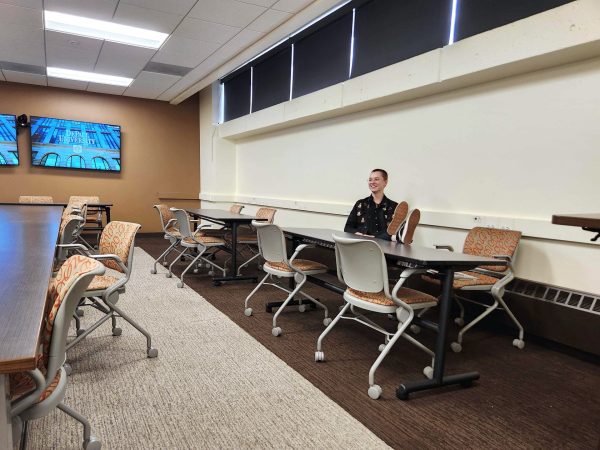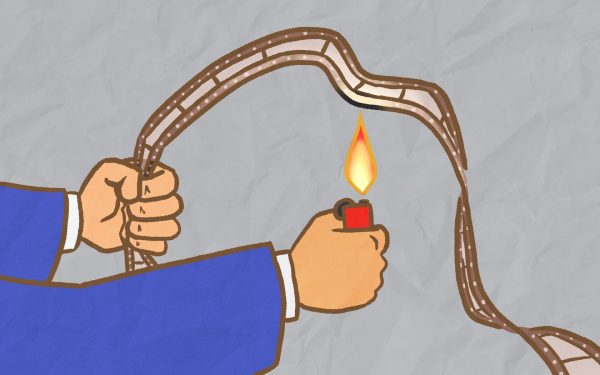Where are frats heading?
Another scandal involving a Syracuse fraternity and two derogatory videos have brought the culture of Greek life at universities across the country into question.
The two videos, released by the Syracuse University newspaper The Daily Orange, show brothers from the Theta Tau fraternity surrounding another member and mocking him through racist, ableist, sexist and anti-Semitic slurs. The second video was released after the university started taking action against Theta Tau and shows fraternity brothers mimicking the sexual assault of a mentally-handicapped person while the rest of the participants watch. Since the video was made public, the university has expelled the fraternity and suspended 18 brothers involved as students protest the hate speech around school grounds.
“You hate to see it come out of fraternities on campus that preach this message of brotherhood and philanthropy,” said Steven Kemp, a freshman at Syracuse.
Before their expulsion, Theta Tau issued an apology with a claim that the video was intended as satire. Those involved were exaggerating the views of a conservative brother in the fraternity, according to the statement. While the student body of the northern New York college is divided on the severity of the consequences for the other Greek life programs, no one is protesting the contents of the video despite Theta Tau’s apology.
While the apology letter attempted to put the problematic actions of the fraternity in context, the contents were more focused on preserving as much reputation for the organization and its members as it could. Insisting the actions were a parody and not the views held by the fraternity is also a poor excuse for the slew of disgusting remarks.
Hearing about fraternities coming under fire for the discovery of such controversies as racist chants or sexist practices is nothing new, but colleges across the country have been handing out more severe consequences as of late. The University of Oklahoma drew national attention in 2015 when they expelled two fraternity members over a chant that suggested the lynching and refusal of fraternity admittance for African-American students. While DePaul has been faced with its share of scandals involving Greek life in recent years (including a few sexual assault cases and an incident involving voluntary waterboarding), nothing as high-profile as the events at Syracuse or Oklahoma has emerged.
Blake Timmerman, a sophomore and member of the Phi Gamma Delta fraternity at DePaul, attributes this to regional differences in fraternities. “In Chicago, even the most pretentious people are aware what’s happening; no one’s ignorant,” he said about fraternity members at DePaul. Greek life at many state schools and bigger private schools like Syracuse are much larger and more rooted in social life than they are at DePaul, where they don’t face as much supervision from their universities – up until a scandal brings them into the spotlight, that is. “If the culture doesn’t align with what the school wants, then they probably won’t be here much longer,” he said.
However, as stories about misconduct from fraternities continue to emerge, many doubt the longevity of the Greek life system as a whole. While service and brotherhood have been an immediate association with fraternity and sorority culture, so has excessive partying and a reputation for getting into trouble. The negative aspects of these organizations are now frequently being exposed due to technological transparency. Hyuk Kim was a member and eventual president of the Pi Kappa Phi fraternity at Roanoke College from 1977 to 1981, and although he still remains involved and advises his old fraternity, he doubts Greek life has longevity.
“It’s a different world today,” said Hyuk. “A lot of stuff that went on in the 70s was pretty over the top, even for me. There was no social media, there were no cell phones.”
With the ability to easily and instantly share nearly anything that can be recorded with a smartphone, the outdated and often derogatory practices and attitudes that are still part of Greek life are out in the open. “I don’t think those fraternities will survive if they stick to what they’re doing now,” said Hyuk. This negative image held by many in and outside of college about Greek life can be changed, but only if these organizations are taking it upon themselves to do so. Fraternities need to start having conversations and take a hard look at what kind of culture they’re promoting before the university steps in and takes matters into their own hands.







